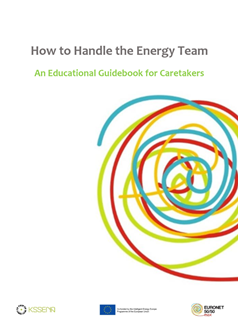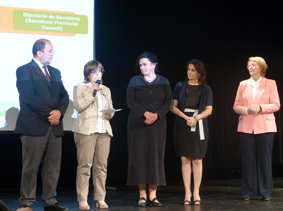Τι νέο υπάρχει για το Πρόγραμμα;
Energy savings achieved in Slovenian schools
Passing the baton in the School Complex in Čáslavice, Czech Republic
News from Cyprus
In total 40 teachers and 136 students are directly involved in the project, while more than 1900 are involved indirectly. Dedicated meetings were attended by the headmaster, the teachers coordinating the work of the energy team and - in some cases - also the students participating in the team. CEA\'s staff explained the attendants how to implement the 50/50 methodology step by step, how to use presented measuring devices, as well as went through the educational booklet and the lesson scenarios in order for the teachers to feel comfortable with them. Before the meetings, the schools were also asked to gather and provide electricity and heating bills, which will be later used to calculate the energy savings.
The overall feedback received from schools was positive and encouraging! The teachers highlighted that educational boxes will facilitate their work with the energy teams a lot. The students were really enthusiastic with the measuring devices, the posters and other material provided. The headmasters and teachers understood the 50/50 methodology and committed to engage all building users in the school’s efforts to save energy.
Evaluation of the first year of implementation of the 50/50 concept
The 1st cycle of implementation of the 50/50 methodology has been completed and it's time for its evaluation! We asked representatives of schools and other public buildings involved in the project about their experiences, opinions and suggestions for the future. Two questionnaires were prepared (for schools and for other buildings) and translated into all project languages. The feedback was collected via an e-form, which significantly simplified the process.
In total 314 schools and 12 other public buildings filled in the questionnaire and the feedback received was very positive. Most of the schools consider the project very interesting and useful, both from the pupils' and the teachers point of view. They believe that it has a lot of positive impacts and that - as a result - energy awareness, knowledge and consumption habits of the building users have changed a lot. There are, however, also some challenges that need to be tackled. The biggest one is finding time for project activities in the - rather hectic - everyday work schedule. The school days are full of action, the requirements of the curriculum need to be fulfilled and there are already many other projects going on. It is also challenging - especially in bigger schools - to get the whole school community involved, interested, aware and active. Still, the teachers put a lot of effort to successfully implement all steps of the 50/50 methodology, as they are convinced that saving energy and protecting the environment are so important, that they should be fitted in the school agenda anyway.

The experiences of the schools
EURONET 50/50 MAX on Facebook!
 We are pleased to announce that now you can follow our activities, as well as activities and achievements of schools and other public buildings involved in the 50/50 Network, on Facebook. Join us not only to learn from the others but also to share your valuable experience and opinions!
We are pleased to announce that now you can follow our activities, as well as activities and achievements of schools and other public buildings involved in the 50/50 Network, on Facebook. Join us not only to learn from the others but also to share your valuable experience and opinions!
There are over 500 schools, 60 municipalities and 48 other public buildings already involved in the EURONET 50/50 MAX project. Each of them has its own experience in energy education, energy saving and working with the energy teams. Use the opportunity to learn from them, get inspired by them and also share your own achievements, best practices and useful tips!
Link to our English Facebook profile is following: https://www.facebook.com/EURONETMAX
You may also follow country-level disputes on national Facebook profiles administered by EURONET 50/50 MAX partners. They can be accessed from different language versions of this website.
Once again, we would like to invite you to join our energy-saving community!
How to handle the energy team? Find answers in our new guidebook
 Our new guidebook entitled “How to handle the energy team” contains many useful tips how to organise energy tour around the school building and to help children analyze energy situation of their school. The publication is addressed to school caretakers who play very important role in the 50/50 project. As they best know the building, its energy system and appliances in use, they can help students find out how and where energy is used at school, as well as support them in implementation of energy-saving measures.
Our new guidebook entitled “How to handle the energy team” contains many useful tips how to organise energy tour around the school building and to help children analyze energy situation of their school. The publication is addressed to school caretakers who play very important role in the 50/50 project. As they best know the building, its energy system and appliances in use, they can help students find out how and where energy is used at school, as well as support them in implementation of energy-saving measures.
In the publication the caretakers will find guidelines how to organise the work with the energy team, how to prepare energy review of the school building, how to communicate with children and how to thoroughly discuss all energy sources used at school and necessary to its normal operation. The guidebook will also help caretakers to prepare for the possible questions raised by the pupils.
Although the guidebook is addressed to caretakers, also the teachers involved in the 50/50 project are invited to read the document. They will find here many useful information which they can use during their work with children, including information about model, low-cost energy-saving measures and modern technological solutions for clean and efficient energy production. It is worth to discuss them with students to increase their knowledge about energy production and consumption, however it should be remembered that bigger energy-related investment are not included in the EURONET 50/50 MAX project.
Εκπαίδευση Δήμων, σχολείων και χρηστών υπόλοιπων δημόσιων κτιρίων που συμμετέχουν στο EURONET 50/50 MAX
Το διάστημα αυτό οι εταίροι του Προγράμματος ενημερώνουν τα σχολεία, αλλά και τους χρήστες άλλων δημόσιων κτιρίων, προσκαλώντας τους να συμμετάσχουν στο EURONET 50/50 MAX. Το εγχείρημα αυτό δεν είναι εύκολο, καθώς πρέπει να συμμετάσχουν 500 νέα σχολεία και σχεδόν 50 άλλα δημόσια κτίρια, όμως το ενδιαφέρον για την έννοια 50/50 είναι μεγάλο, οπότε όλο και περισσότερα σχολεία εκφράζουν την επιθυμία να γίνουν μέλη του Δικτύου 50/50.
Προκειμένου να βοηθήσουμε τα νέα μέλη του Δικτύου στην εφαρμογή του 50/50, οργανώνουμε ενημερωτικές και εκπαιδευτικές συναντήσεις σε κάθε χώρα, κατά τη διάρκεια των οποίων συζητούνται διεξοδικά τα διάφορα θέματα του Προγράμματος. Όσοι συμμετέχουν στις ενημερωτικές αυτές εκδηλώσεις μαθαίνουν βήμα – βήμα την εφαρμογή της μεθοδολογίας 50/50 και τον τρόπο υπολογισμού της εξοικονόμησης ενέργειας που επιτυγχάνεται με τη διαδικασία αυτή. Ακόμη, οι συμμετέχοντες ενημερώνονται για τη συμφωνία ανάμεσα στον τοπικό Δήμο / Δημόσιο Φορέα και στα σχολεία ή στα υπόλοιπα δημόσια κτίρια που συμμετέχουν στο Πρόγραμμα, αλλά και για τις διαδικασίες της αξιολόγησης και των εκθέσεων. Σύντομα θα βρείτε εδώ πληροφορίες για της εκδηλώσεις που οργανώθηκαν στις διάφορες χώρες.
Εάν δεν συμμετέχετε στο Πρόγραμμα, αλλά επιθυμείτε να εφαρμόσετε τη μεθοδολογία 50/50 στο κτίριο ή στα κτίριά σας, παρακαλούμε επικοινωνήστε μαζί μας στέλνοντας ηλεκτρονικό μήνυμα στη διεύθυνση Αυτή η διεύθυνση ηλεκτρονικού ταχυδρομείου προστατεύεται από τους αυτοματισμούς αποστολέων ανεπιθύμητων μηνυμάτων. Χρειάζεται να ενεργοποιήσετε τη JavaScript για να μπορέσετε να τη δείτε..
Το πρώτο Πρόγραμμα EURONET 50/50 κέρδισε το Ευρωπαϊκό Βραβείο Βιώσιμης Ενέργειας για το 2013!
 Είμαστε στην ευχάριστη θέση να σας ανακοινώσουμε ότι το πρώτο Πρόγραμμα EURONET50/50 κέρδισε το Ευρωπαϊκό Βραβείο Βιώσιμης Ενέργειας για το 2013 (Sustainable Energy Europe Award 2013) στην κατηγορία της «εκπαίδευσης»! Τα βραβεία απονέμονται από την Ευρωπαϊκή Επιτροπή με σκοπό τη θεσμική αναγνώριση και την προβολή των καλύτερων πρωτοβουλιών για τη βιώσιμη ενέργεια σε πανευρωπαϊκό επίπεδο. Τη χρονιά αυτή, 244 Προγράμματα και δράσεις διαγωνίστηκαν για το βραβείο, επομένως ο ανταγωνισμός ήταν πολύ σκληρός!
Είμαστε στην ευχάριστη θέση να σας ανακοινώσουμε ότι το πρώτο Πρόγραμμα EURONET50/50 κέρδισε το Ευρωπαϊκό Βραβείο Βιώσιμης Ενέργειας για το 2013 (Sustainable Energy Europe Award 2013) στην κατηγορία της «εκπαίδευσης»! Τα βραβεία απονέμονται από την Ευρωπαϊκή Επιτροπή με σκοπό τη θεσμική αναγνώριση και την προβολή των καλύτερων πρωτοβουλιών για τη βιώσιμη ενέργεια σε πανευρωπαϊκό επίπεδο. Τη χρονιά αυτή, 244 Προγράμματα και δράσεις διαγωνίστηκαν για το βραβείο, επομένως ο ανταγωνισμός ήταν πολύ σκληρός!
Η τελετή απονομής των βραβείων πραγματοποιήθηκε στις Βρυξέλλες στις 24 Ιουνίου, στο πλαίσιο της Ευρωπαϊκής Εβδομάδας για τη Βιώσιμη Ενέργεια. Το βραβείο για το EURONET 50/50 παρέλαβαν οι εκπρόσωποι του Περιφερειακού Συμβουλίου της Βαρκελώνης, που ήταν ο Γενικός Συντονιστής του Προγράμματος.
Η βράβευση του EURONET 50/50 αποδεικνύει τη μεγάλη επιτυχία του Προγράμματος και καταδεικνύει ότι η μεθοδολογία 50/50 αξίζει να γίνει ευρύτερα γνωστή σε Δημόσιες Αρχές της Ευρώπης, σε εκπαιδευτικά ιδρύματα και σε χρήστες άλλων δημόσιων κτιρίων. Με ένα τόσο επιτυχημένο ξεκίνημα, είμαστε πεπεισμένοι ότι το νέο Πρόγραμμα EURONET 50/50 MAX θα έχει ακόμη πιο εντυπωσιακά αποτελέσματα!
Έναρξη του Προγράμματος EURONET 50/50 MAX
Με χαρά σας ενημερώνουμε ότι το Πρόγραμμα EURONET 50/50 MAX ξεκίνησε επίσημα κατά τη συνάντηση και το ανοιχτό συνέδριο που πραγματοποιήθηκαν στις Βρυξέλλες στις 13 και 14 Μαΐου.
Το συνέδριο του 50/50, με τον τίτλο «Παροχή κινήτρων και ενθάρρυνση των χρηστών για την εξοικονόμηση ενέργειας σε σχολεία και άλλα δημόσια κτίρια», είχε ως στόχο τη διάδοση των αποτελεσμάτων του πρώτου Προγράμματος EURONET 50/50 και να προωθήσει την έννοια του 50/50 ανάμεσα στα Ευρωπαϊκά θεσμικά όργανα. Η εκδήλωση ξεκίνησε με τις παρουσιάσεις της Ευρωπαϊκής Επιτροπής [από εκπροσώπους του Εκτελεστικού Οργανισμού για τον Ανταγωνισμό και την Καινοτομία (EACI) που διεξάγουν το Πρόγραμμα της Ευφυούς Ενέργειας και από εκπροσώπους της Γενικής Διεύθυνσης Εκπαίδευσης και Πολιτισμού] και με τις παρουσιάσεις του Γραφείου του Συμφώνου των Δημάρχων, που τόνισαν τη συμβολή του Προγράμματος στην επίτευξη των στόχων της Ευρώπης για το κλίμα και την ενέργεια.
Μέσω του συνεδρίου δόθηκε επίσης η ευκαιρία να γίνει γνωστή η προηγούμενη εμπειρία και οι επιτυχίες της εφαρμογής της έννοιας 50/50. Οι παρουσιάσεις έγιναν από τους εκπροσώπους της πόλης του Αμβούργου (Γερμανία) (της πρώτης πόλης που εφήρμοσε τη μεθοδολογία 50/50!), από το Συμβούλιο της πόλης Κορνέλλα (Ισπανία) και από ένα από τα σχολεία της Φινλανδίας (Σχολείο του Δυτικού Δάσους, Länsimetsän koulu) έδωσαν κίνητρο σε όλους τους παρευρισκομένους. Ακόμη, μέσω του συνεδρίου γνωστοποιήθηκε επισήμως η έναρξη του δεύτερου Προγράμματος EURONET 50/50, που φέρει τον τίτλο «EURONET 50/50 MAX». Το νέο Πρόγραμμα θα επιτύχει ακόμη καλύτερα αποτελέσματα, μέσω της συμμετοχής 500 νέων σχολείων στο Δίκτυο 50/50 και τη δοκιμαστική εφαρμογή της έννοιας 50/50 σε άλλα δημόσια κτίρια.
Εκτός από το συνέδριο πραγματοποιήθηκε συνάντηση των εταίρων του Προγράμματος, κατά την οποία συζητήθηκαν οι εργασίες που πρέπει να πραγματοποιηθούν, καθώς και τα επιδιωκόμενα αποτελέσματα σε Ευρωπαϊκό και εθνικό επίπεδο για κάθε συμμετέχουσα χώρα.



















 Η ευθύνη για το περιεχόμενο του παρόντος ιστοτόπου βαρύνει αποκλειστικά τους συντάκτες του και δεν απηχεί κατ’ ανάγκη την άποψη της Ευρωπαϊκής Ένωσης. Η ΕACI και η Ευρωπαϊκή Επιτροπή ουδεμία ευθύνη φέρουν για οποιαδήποτε χρήση των πληροφοριών που περιλαμβάνονται στον παρόντα ιστότοπο.
Η ευθύνη για το περιεχόμενο του παρόντος ιστοτόπου βαρύνει αποκλειστικά τους συντάκτες του και δεν απηχεί κατ’ ανάγκη την άποψη της Ευρωπαϊκής Ένωσης. Η ΕACI και η Ευρωπαϊκή Επιτροπή ουδεμία ευθύνη φέρουν για οποιαδήποτε χρήση των πληροφοριών που περιλαμβάνονται στον παρόντα ιστότοπο.